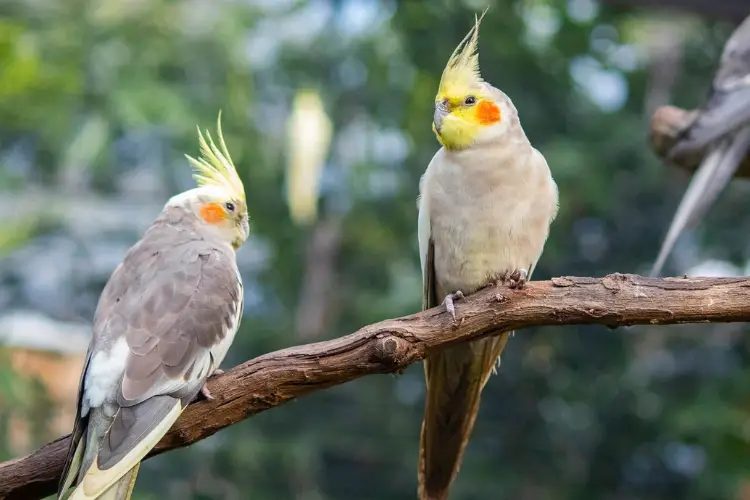Like most birds, cockatiels use their beaks for fighting and self-defense. Some pets bite hard enough to hurt and injure their counterparts in a fight. This, then, begs the question, are cockatiel bites dangerous? Does it hurt?
So, do cockatiels bites hurt? Yes, if a cockatiel bites hard enough, it can hurt. The bites can break the skin and are more severe if on sensitive parts like lips and ears. Cockatiel bites are not as bad as some larger birds’ bites and can be treated using basic first aid.
In this article, you will learn about cockatiels’ bites, how hard they bite, and their severity. You will also know how you can handle the bites and when to seek medical attention.
Do Cockatiel Bites Hurt? Does It Draw Blood?
It is in the nature of living things to issue warnings to a potential threat before attacking. A cockatiel issues its warning by hissing and screeching. After that if the intruder doesn’t retreat, they nip. A nip is gentle and doesn’t hurt much since it’s only a warning followed by a harder bite. A cockatiel bite hurts and may hurt even more if the pet is agitated or the bite is on a sensitive body part.
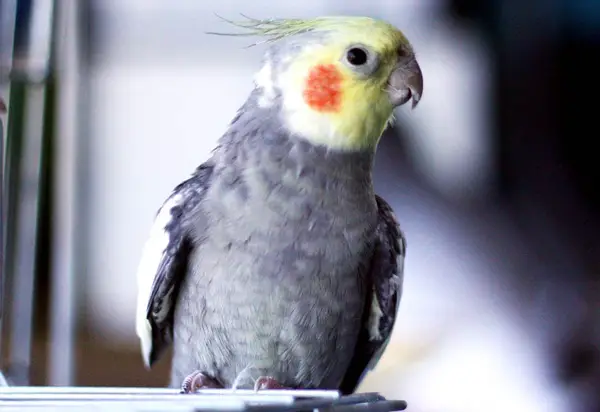
If the bird bites hard enough, it can break the skin and draw blood. Bleeding is not much in a finger and can be compared with a paper cut, though less bloody. The bites are more likely to cause a blood hemorrhage if on softer body parts like the nose, lips, ears, or neck. Cockatiels also possess sharp claws that can also cause harm and draw blood.
Do Cockatiels Like Biting?
A happy and healthy cockatiel is less likely to bite its owners for no reason. However, if your pet feels threatened, fearful, or in a breeding mood, it will bite more. Also, if you haven’t bonded well, it will be more likely to treat you as a stranger and bite you.
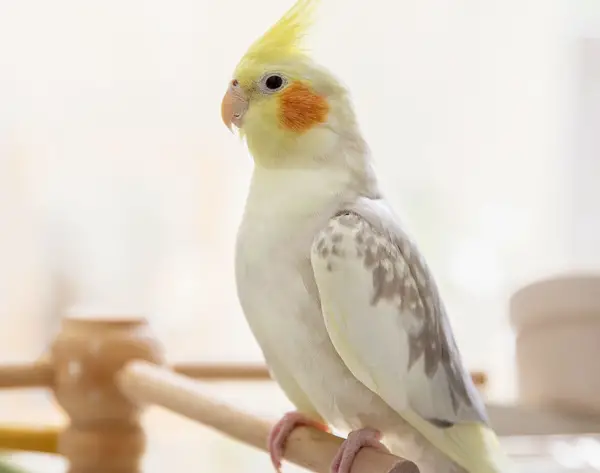
Remember, cockatiels bite to send across a message. As much as these pet birds like biting, try to find out the reason, especially when they overdo it. It may be normal or not, so it’s up to you to discover.
What Is The Bite Force Of A Cockatiel Compared To Other Birds?
The force cockatiels put in their bite varies with the type of bite and the reason for biting. A peck is gentle, with only less pressure used. A nip is also gentle, followed by a forceful bite which is hard enough to form a mark. However, a great deal of force is in a hard bite, a bite they do when angry or in a fight.
Though a cockatiel bite can hurt, it doesn’t hurt as much as bites by some pet birds. Macaws have a bite strength of between 500 – 700 PSI, which is way more severe than that of cockatiels. Cockatiel bites are also less intense than cockatoos who can bite and break a child’s finger.
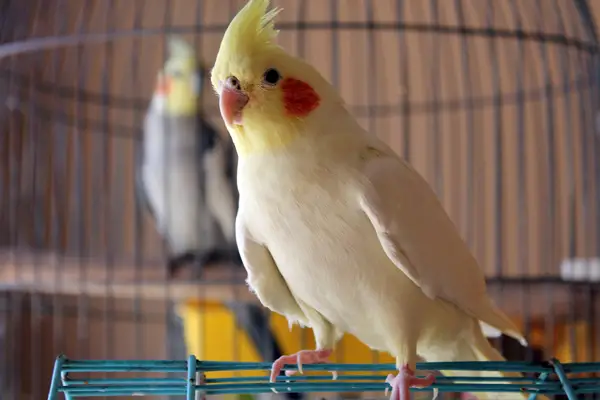
Most times, birds with bigger beaks are more likely to cause more harm than those with small ones. These beaks come with stronger muscles, which makes them more likely to break the skin and cause bleeding. However, most parrot birds have a bite strength between 300 – 400 PSI, which can hurt.
Also read: Cockatiel Puffed Up
How Do You Handle a Cockatiel Bite?
If your pet bites you but doesn’t break the skin, you should avoid petting it until it cools down. Most times, provoking the pet repeatedly will agitate it enough to make it bite you harder. In case the bite broke your skin, use running water to clean the wound before visiting a nearby clinic. In some cases, if the injury is too severe, antibiotics are prescribed.
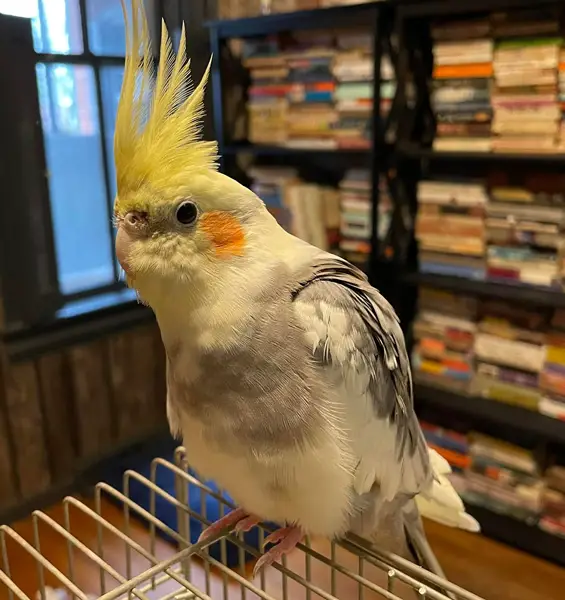
If left untreated, you risk getting a bacterium that causes psittacosis disease, which birds carry, and people can be infected. Also, bites in some sensitive parts will cause bleeding and need immediate medical attention. Even if the injury doesn’t look life-threatening, it’s always best to visit a medical professional to investigate it.
How To Stop Cockatiel From Biting?
A cockatiel might bite you for many reasons, including agitation, fear, or if in a bad mood. To decide on the method to use, you must first know the reason for the bite. The earlier you fix the biting problem, the better the chances of discouraging it from developing into a habit.
One way to stop a cockatiel from biting while it’s perched on your hand is by making it lose balance. You can do this by tilting your hand after it bites you, which with time will discourage it from biting. After some time, the bird will stop biting you unless it’s nipping to request you to play with it.
You can also use treats to discourage your bird from biting. For this method, withhold treats from your pet if it bites you, only providing when they don’t. Also, create time to bond with your pets so they can become familiar with you and be less hostile. Every pet during its first days in a new environment is fearful, and petting them can earn you a bite.
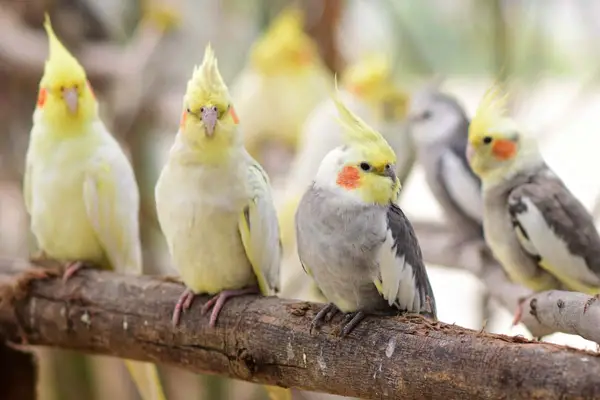
If your budgie enjoys shoulder rides, you can deny it such treats until the behavior improves. Ensure you shoulder-ride those that behave well and deny the biters. While at it, ensure you don’t express hate because the bird may eventually hate you, or read malice. The bottom line should be training it to stop biting, and so you should also reward it when it behaves well.
Cockatiels can also cause harm if their claw nails grow too long. The claws can scratch and tear through your skin while it’s perching on your bare skin. Regular nail trimming is advised, along with beak clipping to keep the pet safe.
Why Does My Cockatiel Bite My Lip?
If your cockatiel likes nipping your lips, it is very likely that you have a good relationship. They rarely bite hard but only peck a little to express affection. However, you should carefully observe any other behavior they exhibit alongside the pecks, as they could imply distress, or hunger. If the bird is cheery and active, it may also be calling on you to play with it.
Your cockatiel could also be pecking your lips because they look like beaks. If this is not the reason, then they may be feeling insecure and doing this to safeguard their territory. Although nipping is not bad, don’t condone hard bites, as they could easily break the soft skin.
Unless it’s a call to play or a show of love, always say no to hurting bites. You do not have to shout to send the message home. A simple no and taking the bird back to the cage will do. Don’t feel guilty for doing this, as it is the easiest way to tame an overly nippy cockatiel.
Cockatiel Bite Infection
Though it is less common, if your cockatiel tears your skin, you can contract a disease and get sick. Birds carry avian chlamydiosis, a disease caused by a bacteria called chlamydia psittaci. Visit a medical clinic if the bird bites you to get checked.
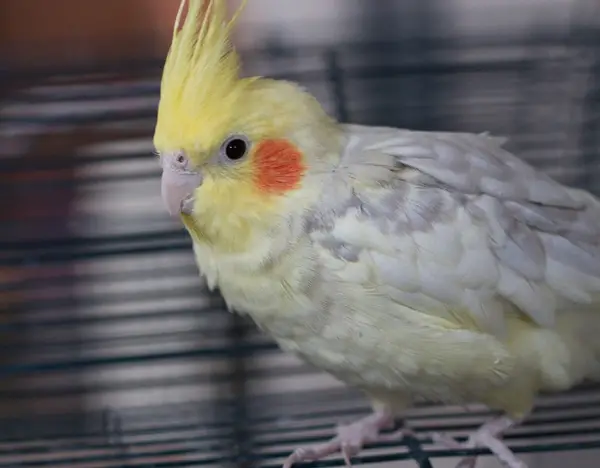
Thankfully, it’s not always a great concern, especially because it is not likely that a cockatiel bite will break your skin. Also, rarely are their bites serious unless you made a wrong approach. If, after assessing the bite, you’re convinced it is serious, don’t gamble, do as we’ve advised above.
FAQ
Most pets kept at home are capable of biting or scratching the owners or other household pets. It’s only fair for pet owners to research the possible damage these pets can make. However, since not every piece of information is available beforehand, we saw it fit to answer the below commonly asked questions.
One of the reasons why your pet might bite you when you’re playing or petting them is to communicate. The pet might be signaling it’s tired and doesn’t need any more petting or be requesting your attention. To better understand their intention, observe other body signs like their eyes to tell if it looks tired or sleepy.
When your cockatiel bites, it may release a force of between 300 and 400 PSI. They regulate the impact depending on their reason for biting. You now know why the bite may tear or not tear your skin.
If the behavior changes suddenly, your cockatiel may be tired. It may bite when you try petting it, to mean it is not in the mood. In this case, put it back in the cage and allow it to rest. If the behavior persists, evaluate the condition to know the reason behind that behavior.
Related: Do Cockatiels Have a Good Sense of Smell?
Outro
As you might have seen with other pet birds, cockatiels can bite too. However, the question is the severity of their bite and if they are dangerous. Though their bites can hurt, they’re less severe than other larger pet birds like macaws and cockatoos. As said, it also depends on where they bite you.
If a bite breaks the skin and causes bleeding, it’s best to seek medical attention from a nearby hospital. This is to discourage any disease that you might contract from the bite. However, the greater task is to discourage the biting, which, if tolerated, can develop into a habit. Thankfully, you are now fully equipped with the right knowledge on how to manage all this without hurting your pet bird.
